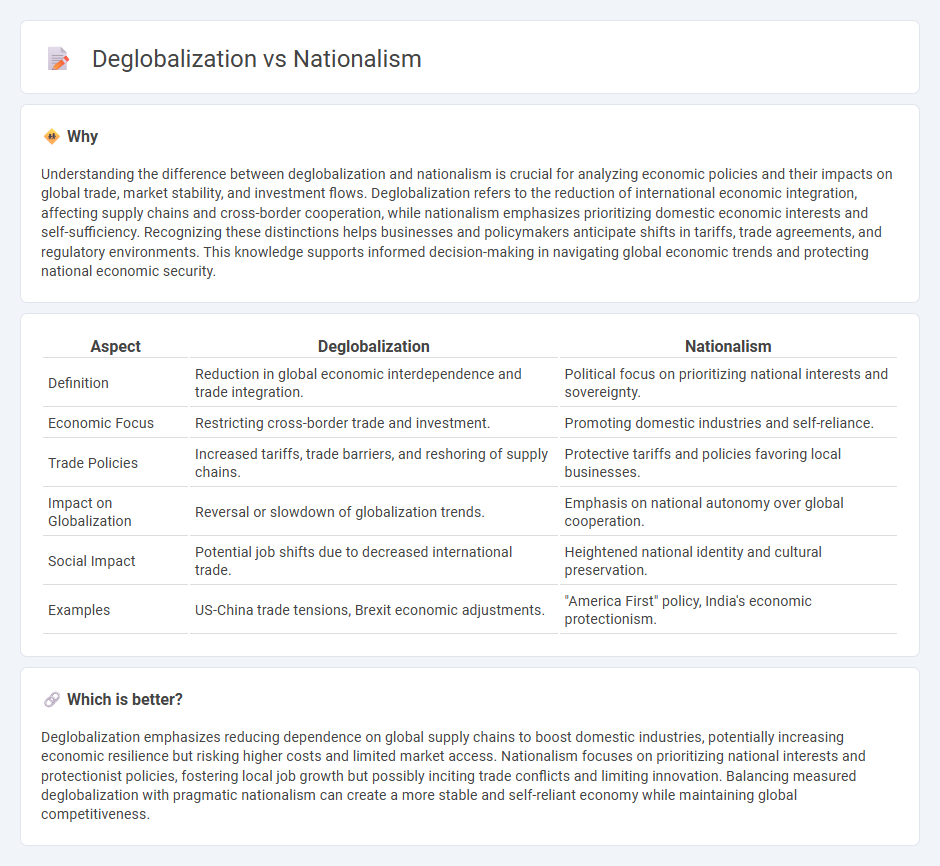
Deglobalization drives countries to prioritize local industries and reduce reliance on international supply chains, impacting global trade flows and investment patterns. Nationalism amplifies protectionist policies, fostering economic self-sufficiency while challenging multinational cooperation. Explore how these trends reshape global markets and influence future economic strategies.
Why it is important
Understanding the difference between deglobalization and nationalism is crucial for analyzing economic policies and their impacts on global trade, market stability, and investment flows. Deglobalization refers to the reduction of international economic integration, affecting supply chains and cross-border cooperation, while nationalism emphasizes prioritizing domestic economic interests and self-sufficiency. Recognizing these distinctions helps businesses and policymakers anticipate shifts in tariffs, trade agreements, and regulatory environments. This knowledge supports informed decision-making in navigating global economic trends and protecting national economic security.
Comparison Table
| Aspect | Deglobalization | Nationalism |
|---|---|---|
| Definition | Reduction in global economic interdependence and trade integration. | Political focus on prioritizing national interests and sovereignty. |
| Economic Focus | Restricting cross-border trade and investment. | Promoting domestic industries and self-reliance. |
| Trade Policies | Increased tariffs, trade barriers, and reshoring of supply chains. | Protective tariffs and policies favoring local businesses. |
| Impact on Globalization | Reversal or slowdown of globalization trends. | Emphasis on national autonomy over global cooperation. |
| Social Impact | Potential job shifts due to decreased international trade. | Heightened national identity and cultural preservation. |
| Examples | US-China trade tensions, Brexit economic adjustments. | "America First" policy, India's economic protectionism. |
Which is better?
Deglobalization emphasizes reducing dependence on global supply chains to boost domestic industries, potentially increasing economic resilience but risking higher costs and limited market access. Nationalism focuses on prioritizing national interests and protectionist policies, fostering local job growth but possibly inciting trade conflicts and limiting innovation. Balancing measured deglobalization with pragmatic nationalism can create a more stable and self-reliant economy while maintaining global competitiveness.
Connection
Deglobalization and nationalism are interconnected as the rise of nationalist policies often drives countries to reduce international trade and investment, emphasizing self-reliance and protectionism. Nationalist economic strategies prioritize domestic industries and labor markets, which can lead to decreased global economic integration and slower cross-border capital flows. This shift impacts global supply chains and international cooperation, reshaping the economic landscape toward regionalism and localized production.
Key Terms
Trade Barriers
Trade barriers play a critical role in both nationalism and deglobalization, where countries impose tariffs, quotas, and import restrictions to protect domestic industries and prioritize national interests. Nationalism intensifies these barriers to assert economic sovereignty and reduce dependency on foreign markets, often leading to trade wars. Explore further to understand the complex impacts of these policies on global commerce and economic stability.
Protectionism
Protectionism is a key feature distinguishing nationalism from deglobalization, emphasizing barriers like tariffs and quotas to shield domestic industries from foreign competition. Nationalism prioritizes economic sovereignty and cultural identity, often driving protectionist policies to preserve national interests. Explore deeper insights into how protectionism shapes global trade dynamics and policy frameworks.
Economic Sovereignty
Economic sovereignty emphasizes a nation's control over its own economic policies, resources, and markets, often championed by nationalist movements seeking to protect domestic industries from foreign influence. Deglobalization trends reinforce economic sovereignty by promoting reduced dependency on global supply chains and encouraging local production and consumption. Discover more about the interplay between nationalism and deglobalization in shaping the future of economic sovereignty.
Source and External Links
What Is Nationalism? Definition and Examples - Nationalism is an ideology where devotion and loyalty to one's country take precedence over other group obligations, often based on shared ethnicity, language, or culture.
Nationalism | Oxford Research Encyclopedia of Politics - Nationalism is a set of beliefs that elevate the nation as the central community, demanding that loyalty to the nation outranks all other identities and obligations.
Nationalism - Nationalism is an idea or movement asserting that the nation should be congruent with the state, promoting self-governance, national identity, and unity based on shared characteristics like culture, language, or history.
 dowidth.com
dowidth.com